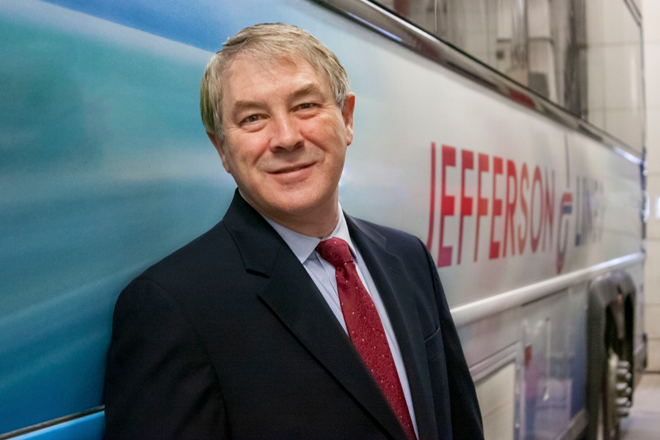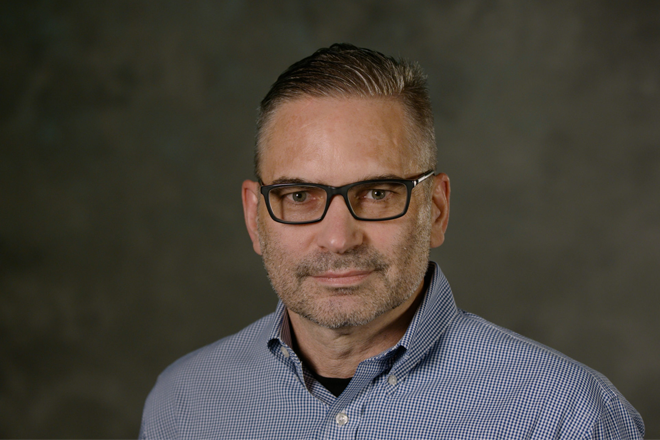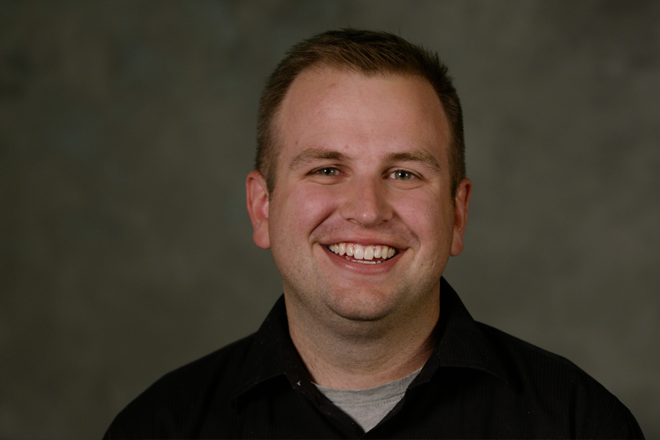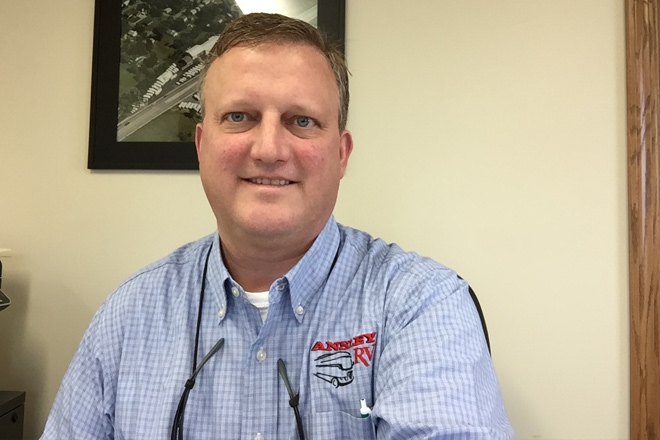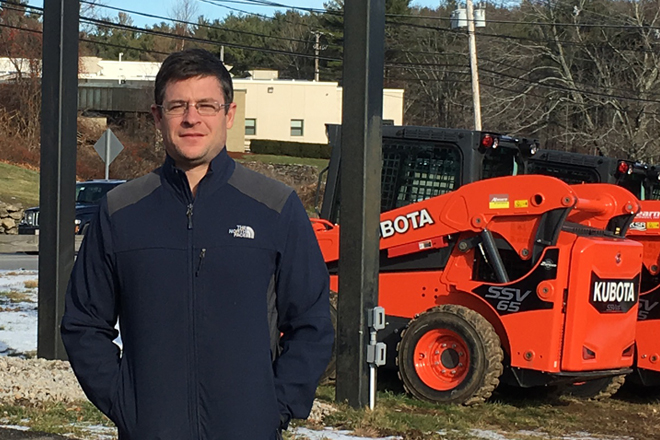Before Steve Woelfel joined Jefferson Lines as CFO in 2005, he spent 15 years in the television industry. A desire for a better cultural fit led Steve to Jefferson Lines where he received a crash course in the motorcoach industry by joining a Spader 20 Group in 2006. Since then, Steve has advanced to lead the company as president and CEO while maintaining strong friendships and building industry relationships through his 20 Group.
How did you begin your relationship with Spader?
We started working with them in 2006. I was new to the industry, and I was talking to the CEO at the time and said I’m just interested in how to get some benchmarking numbers. From a television standpoint, your overnight ratings, you knew the metrics, and really was missing that and not having it here. And about that time I think Spader was forming a brand new 20 Group and saw that opportunity to benchmark against my peers and share best practices as something that would really help our business.
What were the biggest benefits of joining your first 20 Group?
Getting that benchmarking and building those relationships with a number of people that are still dear friends today, hastening my development in understanding the industry, and it helped me, quite frankly, be in a position to be able to assume the president and CEO role.
The other thing it really did is, those two-and-a-half-day meetings, that’s two-and-a-half-days that it was myself and the president talking about, “Hey, here are the trends, what if we did this? What if we did that?” So we got more into the business strategy just because we were away from the office instead of a quick half-hour conversation, “Oh yeah, we should talk about that,” it was a little more in-depth.
It exceeded my expectations because like I said, it gave me some benchmarking upon which to use my financial expertise to help shape and drive Jefferson and where we needed to go. But it also helped me have more meaningful conversations with our president and CEO, because he was focused on it during those meetings.
Who else from your team participates in 20 Group meetings?
I’ve pretty much gone to all the meetings, and then really depending on the agenda for the meeting, I will invite different people. I’ll usually have my financial person come to every meeting, because there’s a financial component that we go through, and it’s good for her to understand why the numbers get reported the way they do and how they tie in. Then I will invite one or two people based on the agenda. It might be charter sales, it might be safety, it might be operations, or it might be human resources. I’ve got seven direct reports and I want all seven of them to be able to take my role and succeed at it.
How has your 20 Group evolved over the years?
I remember coming to Sioux Falls for initial training along with other people in the group. That group stayed together from about 2006 to maybe 2010 or 2011, and then we took the group a little bit different direction. There was a mix of larger carriers and smaller carriers, and we just decided to focus on the larger carriers. So in 2011, we recruited a number of other carriers to join us to do some benchmarking, not only financial but some KPI (key performance indicators) benchmarking. And it was good, because we were able to deal with things, not only financial, because we all had pretty good financial systems in place, but it was much more of the operational, and the people KPIs. I would even say today it’s still the emphasis.
How have you benefited from learning from your peers and building those relationships?
We operate in a highly-regulated industry that’s both capital- and labor-intensive – so not a huge margin. It’s not the software business where you’ve got 60 percent margins. So these meetings and these friendships and relationships really give us an opportunity to have a resource that when I get back here after the meeting and issues arise, it’s comforting to know that I have people who I can call or send an email to and say, “Hey, I’ve got this issue. How do we deal with that?” And if there’s not people within our group that have dealt with it, we’ve got alumni of our group who I can rely on.
Right before Thanksgiving, we had a bus break down in a location that we typically don’t go into. And I know our dispatch group was trying to find some assistance and they came to me, and I said, “Hey, let me call John. I know John, he was in our first group.” I said, “I haven’t talked to John for about four years, but let me call John. I bet he can help us.” And sure enough, I called John and, “Oh yeah, hell, we’ll get you a bus. I didn’t put two and two together, didn’t realize it was your bus that broke down. We’ll take care of you. We’re busy, but we’ll take care of you.” So it’s just those relationships that you can count on people because you’ve got that personal relationship.
How does your Spader facilitator fit into the group?
First of all, I do not believe these meetings would exist if not for having that third-party facilitation. Just would not. We’re all too busy in our day, each and every day to put that agenda together, to organize it, and to lead it. It just would not happen. So first and foremost, that’s a huge role in itself.
But we’ve been fortunate, even though we’ve changed groups, that we’ve had the same facilitator since 2006. And in addition to providing an industry-wide perspective on business trends, he personally knows our businesses and is willing to help bring clarity to the issues that we might be having and the possible solutions. Sometimes you just get so busy working in the business that you don’t step back and see it.
What advice would you give to someone who’s considering joining a 20 Group?
I think the number one obstacle I think that carriers have is that there’s just never enough time. It’s usually not about cost, it’s about time. “I don’t have the time to go there and do that or invest in that.” So when they talk to me about that, I talk to them about what we’ve been doing it for 13 years. I think I’ve been to every meeting except for one or two, and I leave each meeting thinking, “I can’t wait to get back to put this into operation.” And so while it may seem like I don’t have the time, it really is an investment in the business, and it’s an investment that has, in my opinion, both an immediate and a long-term return on investment.
And the work’s going to always be there. Trust me. You could work seven days a week, 24 hours a day in this business and still not feel like you’re ahead. The work’s going to be there, but it’s a matter of how are you going to make that investment to grow your organization?
What challenges are you facing right now and how is your 20 Group helping you face those challenges?
As we look at what’s going on in the industry, a lot of the issues right now are seeing expenses going up. That’s just the trend. We have a health insurance market, personnel costs are going up, and more than ever we have people issues. Are we hiring the right people? How are we going to do it?
I’m in the process of restructuring my whole dispatch area. Let’s just take some time and let’s profile the characteristics a good dispatcher should have, so when we go out and hire, we know what are we’re looking for. We’ve narrowed it down to three or four characteristics, and now when we’re hiring as we’re restructuring our dispatch, we’re hiring against those characteristics. If you hire the right people, it’s going to make my life a lot easier, because quite frankly, as president and CEO, I probably spend 80 percent of my week on people issues.

